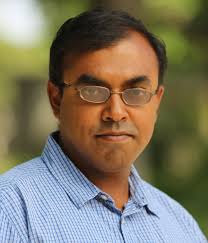CV of organizers
Jiwen Lu, Ph.D. (Contact Person)
· Department of Automation Tsinghua University, China
· Email: lujiwen@tsinghua.edu.cn
. Homepage: http://ivg.au.tsinghua.edu.cn/Jiwen_Lu/
· Biography:
Jiwen Lu is currently an Associate Professor with the Department of Automation, Tsinghua University, China. His research interests include computer vision, pattern recognition, machine learning, and multimedia analysis. He has authored/co-authored over 140 scientific papers in these areas, where 33 papers are published in the IEEE Transactions journals such as TPAMI, TIP, and TCSVT, and 20 papers are published in the top-tier computer vision conferences such as CVPR, ICCV and ECCV. He serves as an Associate Editor of Pattern Recognition Letters, Neurocomputing, and IEEE Access, a Leading Guest Editor of two Special Issues in the Pattern recognition and Image and Vision Computing, a Guest Editor of two other Special Issue in Computer Vision and Image Understanding and Neurocomputing, a Workshop Co-Chair of WACV 2017 and ACCV 2016, a Special Session Co-Chair of VCIP 2015, a Publicity Chair of IJCB 2017, an Area Chair of WACV 2016, BTAS 2016, ICB 2016, ICME 2015, VCIP 2015, and ICB 2015, a TPC member for over 20 international conferences such as ICCV, CVPR, ECCV, ICME and ICASSP, and a reviewer for over 40 international journals such as TPAMI, TIP and TCSVT. He organized several workshops/competitions at some international conferences such as FG 2015, ACCV 2014, ICME2014, and IJCB2014. He was a recipient of the Best Student Paper Award from Pattern Recognition and Machine Intelligence Association of Singapore in 2012, the Top 10% Best Paper Award from IEEE International Workshop on Multimedia Signal Processing in 2014, and the National 1000 Young Talents Plan Program in 2015, respectively. He is a senior member of the IEEE.

Nikolaos Boulgouris, Ph.D
· Department of Electronic & Computer Engineering Brunel University London, United Kingdom
. E-mail: nikolaos.boulgouris@brunel.ac.uk
. Homepage: http://people.brunel.ac.uk/~eestnnb/
· Biography:
Nikolaos Boulgouris is a Senior Lecturer with the Department of Electronic and Computer Engineering of Brunel University London in the United Kingdom. He joined Brunel in September 2010. Between December 2004 and August 2010 he was an academic member of staff at King's College London. Prior to that, he was a Post-Doctoral Fellow with the Department of Electrical and Computer Engineering of the University of Toronto, Canada. Dr Boulgouris received the Ph.D. degree from the Electrical and Computer Engineering department of the University of Thessaloniki, Greece, 2002. His research interests are in the areas of pattern recognition for biometric/biomedical signals, image/video analysis and understanding, and multimedia communications. He was Principal Investigator for the UK group in the EC-funded Project ACTIBIO. He has published over 90 papers in international journals and conferences and his papers have been cited widely in papers by other researchers who work in the same research areas. Dr Boulgouris is Technical Program Co-Chair for IEEE ICIP 2018 and Publications Chair for IEEE ICASSP 2021. He is also on the organizing committee of IEEE MMSP 2017. He has been a member of the IEEE IVMSP Technical Committee since 2014. He currently serves as Senior Area Editor for the IEEE Trans. on Image Processing and the IEEE Trans. on Circuits & Systems for Video Technology. In the past he served as Associate Editor for the IEEE Transactions on Image Processing (2010-2014) and the IEEE Signal Processing Letters (2007-2010). He was co-editor of the book Biometrics: Theory, Methods, and Applications, which was published by Wiley - IEEE Press in 2009, and guest co-editor for two journal special issues on Biometrics. Dr Boulgouris is a Senior Member of the IEEE and a Fellow of UK’s Higher Education Academy..

Amit K. Roy-Chowdhury, Ph.D.
· Dept. of Electrical and Computer Engineering University of California, Riverside
· Email: amitrc@ece.ucr.edu
. Homepage: http://www.ee.ucr.edu/~amitrc/AmitRoyChowdhury.php
· Biography:
Amit Roy-Chowdhury leads the Video Computing Group at the University of California, Riverside (UCR) with research interests in computer vision, image processing, pattern recognition, and statistical signal processing. Dr. Roy-Chowdhury received his PhD from the University of Maryland, College Park in Electrical and Computer Engineering in 2002 and joined UCR in 2004 where he is currently a Professor of Electrical and Computer Engineering and a Cooperating Faculty in the department of Computer Science and Engineering. He has had research collaborations with or consulted with a number of private companies. His group is involved in research projects related to camera networks, human behavior modeling, media forensics, face recognition, and bioimage analysis. Prof. Roy-Chowdhury's research has been supported by various agencies including the National Science Foundation, the US Dept. of Defense, IARPA, National Endowment for the Humanities, and private industries like Google, NVDIA, CISCO, and Lockheed-Martin. His research group has published over 150 papers in peer-reviewed journals and top conferences, including over 40 journal papers and another 28 in highly competitive computer vision conferences (with acceptance rates of ~25%). He is the first author of the book Camera Networks: The Acquisition and Analysis of Videos Over Wide Areas, the first monograph on the topic. His work on face recognition in art was featured widely in the news media, including a PBS/National Geographic documentary and in The Economist. He is an Associate Editor of the IEEE Trans. on Image Processing, IEEE Trans. on Circuits and Systems in Video Technology, and Computer Vision and Image Understanding, and an Area Chair for CVPR2017. He has also served in editorial boards of other journals in the past and been on conference organizing committees.

